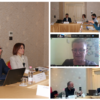The European Movement in Albania (EMA), and the National Chamber of Advocates, in partnership with the Slovak Foreign Policy Association and the financial support of Slovak Aid, held on July 28, 2021, the fourth session, of the Working Group II – Justice, Freedom, Security (Chapter 24) in the framework of the National Convention on European Integration. The focus of this session was the harmonization of EU legislation concerning criminal law. Honorable professors and experts in the field spoke about the path, tasks and challenges that Albania will face during this process.
Nirvana Deliu from the European Movement in Albania moderated the session, where in her opening speech she thanked the participants and the partners who have contributed to the realization of the Convent and announced that the WG 2 sessions will resume during the fall 2021. Deliu underlined the importance of Chapter 24 in the Integration process for Albania and stated that the areas addressed in this chapter are of delicate importance.
Dr. Aida Gugu Bushati, Legal Expert for the EU, in her presentation made a summary of Chapter 24 of the EU Acquis in the framework of criminal law and judicial cooperation. She underlined that unlike civil law, criminal law will face difficulties in harmonizing with EU legislation and requires a longer time to materialize. Bushati emphasized that Albania during the Negotiations Process should continuously change the legislation to harmonize it with that of the EU, prepare the administrative framework, and strengthen law enforcement agencies. According to Bushati to Albania will be required for a high-level performance in the field of border management, fight against corruption, crime, drugs etc. Further in her presentation, Bushati focused on judicial cooperation and the legal basis, where the main pillars of cooperation are found in the Treaty of Functioning of the European Union (TFEU), Articles 82-86 TFEU on Judicial Cooperation and Articles 87-89 TFEU for police cooperation. Bushati further added that the main principles to materialize judicial cooperation are the principle of mutual recognition and through the approximation of legislation. In the end, she concluded by stressing the challenges that await Albania, where Albania must continue to work in judicial cooperation in criminal matters, in the training of the judiciary, in the development of information technology, etc. She also mentioned the EU institutions established and the need to develop such key structures like European Public Prosecutor’s Office (EPPO), the Criminal Justice Agency for Cooperation with Criminal Justice (Eurojust) and the European Judicial Network in Criminal Matters (EJN).
Prof. Dr. Altin Shegani from Faculty of Law, University of Tirana, expert on harmonization of Albanian criminal legislation in the field of criminal offenses focused his presentation on criminal offenses with terrorist purpose. As a start he gave an overview of the normative evolution in Albania in the field of criminal offenses against public order, Shegani underlined the importance of the Legal Package of February 26, 2007, in the fight against terrorism. According to him, the Albanian legislator has managed to draft a well-crafted legislation in the field of criminal offenses against public order by expanding the boundaries of forms of incrimination, legislation which is in line with harmonization with EU legislation. In the end, Shegani concluded with a reflection of the resolutions and measures taken by the Council of Justice and Home Affairs within the EU, which consisted of sanctions for natural and legal persons who are associated with various terrorist groups.
Prof. Ass. Dr. Ervin Karamuço from Faculty of Law, University of Tirana thanked the organizers, and highlighted the importance of the activity in framework of the EU Negotiations Process. According to Karamuço, it is of relevance that the concepts of harmonization of the Legislation fits as well as possible in the Albanian context. Karamuço stated that, Albania is unprepared for crimes as results of occult rituals, either in institutional or academic terms where there is a lack of information about these crimes, and the criminal code is not completed in this area. He further added that it is very necessary to create new legislation related to these crimes, and only then can harmonization with EU resolutions and directives be achieved. Later in his discussion, Karamuço focused on hate crimes, where he underlined that the Albanian legislation is still incomplete, although there are directives and resolutions for the implementation of a new legislation. Finally, he touched on the issue of private detective, where according to him, although the activity of private detective is offered to a large extent, this profession is not regulated in national legislation. According to him, it is also necessary for the judicial system and law enforcement bodies, the consolidation of the activity of the private detective in the Albanian legislation, in the assistance of evidence for certain cases.
Open Discussion: Questions were raised by the participants about the use of the term terrorism and its linkage with term ‘refugee’. Comments about the hate crimes and particular groups assessed as target victims of such crimes were also part of the discussion with the participants of this session.
You may find the activity on Youtube: https://youtu.be/VjjtIfQBe_Y

















